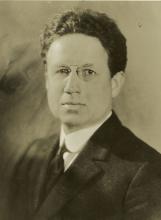Post-Modernism

This is the third and final installment of my little series on Harry Emerson Fosdick, his sermons about Modernism and Science, and how these century-old sermons remind us that our present conversations about the same are anything but new. They may be necessary, but they aren't new. You can read my first post, “I Love How History Repeats Itself,” and my second post, “Science, Faith, and An Ongoing Conversation.”
I want to continue to focus on the same two sermons, "Shall the Fundamentalists Win?" and "The Church Must Go Beyond Modernism," and finish up a line of thought about American Christian Fundamentalism and interlace a third and final sermon entitled, “The Greatness of God” in which Fosdick outlines some of his own understandings of atheism, science, and religion. Typical of Fosdick, there is a tome hidden in between the lines of that sermon. Nevertheless, I'll try to share some of it with you.
What does Fosdick say is the trouble with Modernism? In “The Church Must Go Beyond Modernism,” he lists a few problems. Here's a list:
- “... it is primarily an adaptation, an adjustment, an accommodation of Christian faith to contemporary scientific thinking.”
- for this reason it tends “toward shallowness and transiency” and thus cannot adequately represent the Eternal;
- “Unless the church can go deeper and reach higher than that it will fail indeed.”
- “... excessively preoccupied with intellectualism” eschewing the heart and thus missing much of Christian spirituality
- excessive sentimentality, which means the eternal progress of the human character and the eradication of evil and the loss of moral judgment, scientific progress being equated with human moral progress
- “... modernism has even watered down and thinned out the central message and distinctive truth of religion, the reality of God.”

Okay... for all my friends out there. No, history does not repeat itself. Yes, history is a human construct. Now, if you will all just work with me, take a gander at this longish quotation from the Introduction to The Meaning of Prayer (1916) by Harry Emerson Fosdick (pictured here). The introduction was written by John R. Mott. It could have been written last week.
These meditations and studies on prayer are most timely. Never have there been such extensive and such convincing evidences of the poverty and inadequacy of human means and agencies for furthering the welfare of of humanity; never has there been such a widespread sense of the need of superhuman help; never have there been such challenges to Christians to undertake deeds requiring Divine cooperation; never has there been such a manifest desire to discover the secret of the hiding and of the releasing of God's power. Interest in prayer is world-wide. This is shown in the prominence of this subject in addresses and sermons in all lands, as well as by the growing volume of books and pamphlet literature in different languages. The multiplication of Calls to Prayer and of Prayer Circles, and the formation of Prayer Bands and of Leagues of Intercession, constitute similar testimony. Among Christians everywhere, and even among those who would not call themselves believing Christians, there is being manifested an earnest desire to understand what prayer is and to engage more fully in its exercise.
... An alarming weakness among Christians is that we are producing Christian activities faster than we are producing Christian experience and Christian faith; that the discipline of our souls and the deepening of our acquaintance with God are not proving sufficiently thorough to enable us to meet the unprecedented expansion of opportunity and responsibility of our generation. These studies and spiritual exercises in helping men and women to form that most transforming, most energizing, and most highly productive habit — the habit of Christlike prayer — will do much to overcome this danger.

 A Sunday or two ago, I made mention of -- more to the truth, wrote a whole
A Sunday or two ago, I made mention of -- more to the truth, wrote a whole